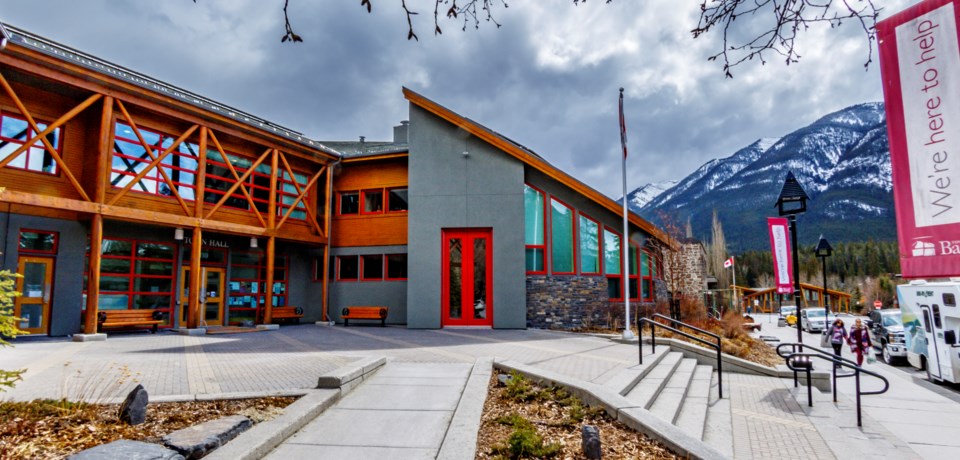BANFF – Banff’s elected officials are under pressure to push back the timeline of local legislation banning businesses from dumping food scraps and recyclable materials into municipal garbage bins.
Administration is proposing that the new bylaw changes, if approved by council at its April 11 meeting, come into effect Oct. 1, 2022.
But officials with Banff and Lake Louise Hospitality Association say the time is not right, especially as businesses are recovering from the COVID-19 pandemic and are facing a labour crisis, and ask the municipality to reconsider its timelines.
“Putting this bylaw into affect in October given the persistent labour crisis seems inconsistent with the goodwill that has been generated thus far in this partner-dependent work,” said Darren Reeder, BLLHA’s executive director, in a letter to council.
“While this timeline may support the Town’s interests for communicating to businesses, it is not suitable for industry given the severe labour shortage the sector is experiencing, while also still being mid-state in the destination’s economic recovery.”
The bylaw is up for consideration at council’s next meeting on April 11. The intention of the proposed bylaw amendments is to implement a ban on placing food scraps and recyclable materials into municipal garbage collection bins.
“These proposed requirements are critical to advance the following council strategic target of 70 per cent waste diversion by 2028 and zero waste to landfill,” said Carla Bitz, resource recovery coordinator for the Town of Banff.
Officials with the Bow Valley Waste Management Commission, however, want to see the ban in place sooner rather than later.
They say an integrated approach is needed in order to address responsible waste management in the Bow Valley and to promote a sustainable tourism economy.
Peter Duck, the commission's regional coordinator, said the Town of Banff has been working on the issue of organic waste for the past 16 years.
“Over that time the Town has been promoting education, establishing physical infrastructure, financial tools and other incentives for residents and businesses to do the right thing,” he said.
“Bans, when used strategically as part of this integrated approach, are just an important next tool to establish community expectations.”
Duck said a ban is a mechanism that helps share the commitment with others along the chain of responsibility for waste.
“I am confident that Bow Valley businesses, supported by the Town, can continue to find creative ways of addressing the challenges,” he said.
“Hopefully, this will happen sooner rather than later, in a time of declared climate warming crisis.”
Banff’s non-residential sector is comprised of businesses, organizations and institutions, and according to the Town of Banff, is responsible for approximately 65 per cent of municipal solid waste.
Results from a 2015-2016 waste study determined that approximately 48 per cent of non-residential waste to landfill consisted of food scraps and food-soiled paper that could have been diverted for composting.
“It is also estimated that an additional 16.6 per cent of all non-residential waste to landfill comes from mixed recyclable materials including paper, glass, plastic and metal,” said Carla Bitz, resource recovery coordinator for the Town of Banff.
Council approved a bylaw amendment in 2021 that required all food and beverage establishments to provide food bins for diversion of food scraps.
In a report to council, Bitz said most non-residential properties are in compliance with this requirement, noting data trends show improvements with respect to the ratio of food to garbage and a general diversion rate increase.
“Despite recent progress, administration estimates that food scraps and food-soiled paper remain the most significant opportunity for improved waste diversion in the Town’s non-residential waste stream,” she said.
In lieu of establishing a bylaw for October, BLLHA has put forward a series of recommendations, which include aggressive education programs to build on the strong partnerships the Town of Banff has with hotels, other businesses and BLLHA.
Reeder said BLLHA, a founding member of their Zero Waste Trailblazers selection committee, has an overarching commitment to sustainability, which has been driven by the interest of its members to advance initiatives to reduce waste, share best practices and prepare for future actions.
“The pandemic no doubt saw some of this work be paused as local businesses struggled to keep operations alive and BLLHA directed its efforts to crisis response,” he said.
Reeder said many operators are not equipped with space or have engaged guests yet to be able to participate in the bylaw without “significant hardship”.
“We hope this can be further explored with businesses to determine alternate solutions,” he said.




